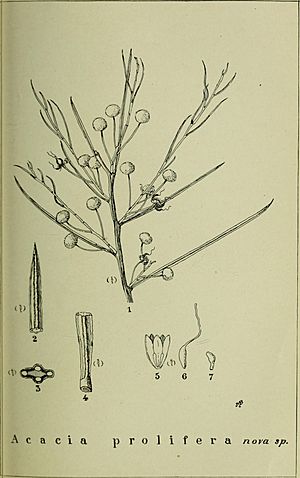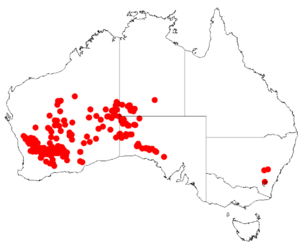Prain's wattle facts for kids
Quick facts for kids Prain's wattle |
|
|---|---|
 |
|
| Sketch of A. prainii in Philosophical Society of Adelaide report. | |
| Scientific classification | |
| Genus: |
Acacia
|
| Species: |
prainii
|
 |
|
| Occurrence data from AVH | |
| Synonyms | |
|
Acacia prolifera |
|
Acacia prainii, often called Prain's wattle, is a type of shrub or small tree. It is part of the Acacia genus, which includes many different wattle plants. This plant is native to Australia, meaning it grows there naturally.
Contents
What Prain's Wattle Looks Like
Prain's wattle is a bushy plant that can grow as a shrub or a small tree. It usually reaches a height of about 1 to 3 meters (3 to 10 feet). Its branches have angles and thin yellow lines along them.
Leaves and Flowers
The plant has special leaf-like parts called phyllodes. These are flat and shaped like a line. They can be 2 to 11 centimeters (1 to 4 inches) long and 0.5 to 3 millimeters (0.02 to 0.12 inches) wide. These phyllodes have a clear main vein and other smaller veins along their edges.
Prain's wattle blooms with yellow flowers from July to October. The flowers grow in groups called inflorescences. These groups look like showy, round balls. Each flower head has 10 to 24 light golden flowers.
Seed Pods and Seeds
After the flowers bloom, curved seed pods start to form. These pods are rounded over the seeds inside them. They are about 8.5 centimeters (3.3 inches) long and 5 to 7 millimeters (0.2 to 0.3 inches) wide.
Inside the pods, you will find shiny black seeds. These seeds are oval-shaped and measure about 3.5 to 6 millimeters (0.14 to 0.24 inches) in length.
How Prain's Wattle Was Named
A botanist named Joseph Maiden first officially described this plant in 1917. A botanist is a scientist who studies plants. He wrote about it in a scientific journal.
Later, in 2003, another botanist named Leslie Pedley reclassified it. This means he put it into a different group, calling it Racosperma prainii. However, in 2006, it was moved back to the Acacia group.
Sometimes, plants have other names that were used in the past. These are called synonyms. Some synonyms for Prain's wattle include Acacia prolifera and Acacia prainii var. linearis.
Where Prain's Wattle Grows
Prain's wattle is found in different parts of Australia. It grows in scattered areas across Western Australia. You can find it in the northern and eastern parts of the Wheatbelt, the Pilbara, and the Goldfields-Esperance regions. It prefers red sandy, loamy, or stony soils.
Its habitat also extends into western South Australia and the Northern Territory. In these areas, it grows in open mallee (a type of eucalyptus woodland), Eucalyptus woodlands, or areas with spinifex plants.

